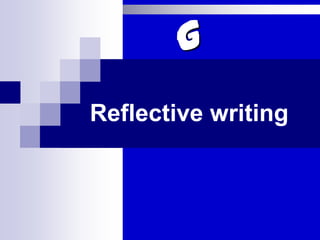
Lecture 5
- 2. • The aim of this presentation is to model some basic ideas about reflective writing. • We are not suggesting that this is the only way to approach it!
- 3. What is reflective writing? • Reflective writing is evidence of reflective thinking. In an academic context, reflective thinking usually involves: • 1 Looking back at something (often an event, i.e. something that happened, but it could also be an idea or object). • 2 Analysing the event or idea (thinking in depth and from different perspectives, and trying to explain, often with reference to a model or theory from your subject). • 3 Thinking carefully about what the event or idea means for you and your ongoing progress as a learner and/or practising professional.
- 4. • Reflective writing is thus more personal than other kinds of academic writing. We all think reflectively in everyday life, of course, but perhaps not to the same depth as that expected in good reflective writing at university level.
- 5. Example of basic reflective writing • Specific tasks were shared out amongst members of my team. Initially, however, the tasks were not seen as equally difficult by all team members. Cooperation between group members was at risk because of this perception of unfairness. Social interdependence theory recognises a type of group interaction called ‘positive interdependence’, meaning cooperation (Johnson & Johnson, 1993, cited by Maughan & Webb, 2001), and many studies have demonstrated that “cooperative learning experiences encourage higher achievement” (Maughan & Webb, 2001). Ultimately, our group achieved a successful outcome, but to improve the process, we perhaps needed a chairperson to help encourage cooperation when tasks were being shared out. In future group work, on the course and at work, I would probably suggest this.
- 6. A possible structure for reflective writing • Reflective thinking – especially if done in discussion with others – can be very ‘free’ and unstructured and still be very useful. Even reflective writing can be unstructured, for example when it is done in a personal diary. In assignments that require reflective writing, however, tutors normally expect to see carefully-structured writing.
- 7. • The example of basic reflective writing on the previous page can be broken down into three parts: description, interpretation and outcome. • 1 Description (keep this bit short!) • What happened? • What is being examined?
- 8. • Example: • Specific tasks were shared out amongst members of my team. Initially, however, the tasks were not seen as equally difficult by all team members.
- 9. 2 Interpretation • What is most important / interesting / useful / relevant about the object, event or idea? • How can it be explained e.g. with theory? • How is it similar to and different from others?
- 10. Example: • Cooperation between group members was at risk because of this perception of unfairness. Social interdependence theory recognises a type of group interaction called ‘positive interdependence’, meaning cooperation (Johnson & Johnson, 1993, cited by Maughan & Webb, 2001), and many studies have demonstrated that “cooperative learning experiences encourage higher achievement” (Maughan & Webb, 2001).
- 11. 3 Outcome • What have I learned from this? • What does this mean for my future? • Example: • Ultimately, our group achieved a successful outcome, but to improve our achievement, we perhaps needed a chairperson to help encourage cooperation when tasks were being shared out. In future group work (on the course and at work), I would probably suggest this.
- 12. • This is just one way of structuring reflective writing. • There are others and you may be required to follow a particular model. Whichever approach to reflection you use, however, try to bear in mind the following four key points:
- 13. • • Reflection is an exploration and an explanation of events – not just a description of them. • • Genuinely reflective writing often involves ‘revealing’ anxieties, errors and weaknesses, as well as strengths and successes. This is fine (in fact it’s often essential!), as long as you show some understanding of possible causes, and explain how you plan to improve. • • It is normally necessary to select just the most significant parts of the event or idea on which you’re reflecting. (The next page has some suggestions on how to do this in your writing.) If you try to ‘tell the whole story’ you’re likely to use up your words on description rather than interpretation. • • It is often useful to ‘reflect forward’ to the future as well as ‘reflecting back’ on the past.
- 14. Vocabulary aid • We are not suggesting specific vocabulary for any descriptive elements of your reflective writing, because the range of possible events, ideas or objects on which you might be required to reflect is so great. • Do remember, though, that if describing an idea, for example a theory or model, it is usually best to use the present tense e.g. ‘Social interdependence theory recognises…’ (not ‘recognised’). • Events, of course, are nearly always described using the past tense.